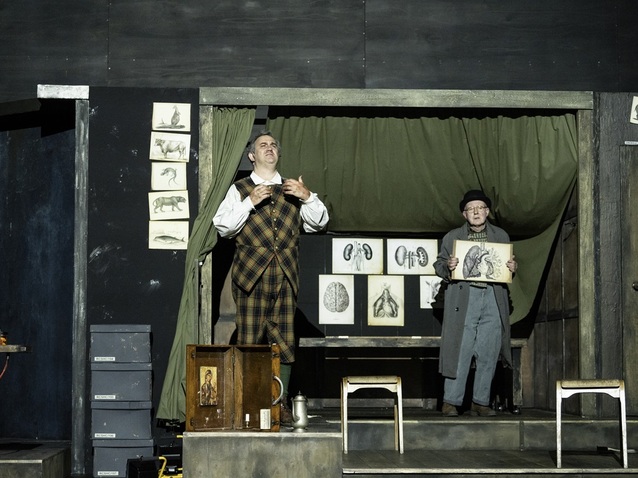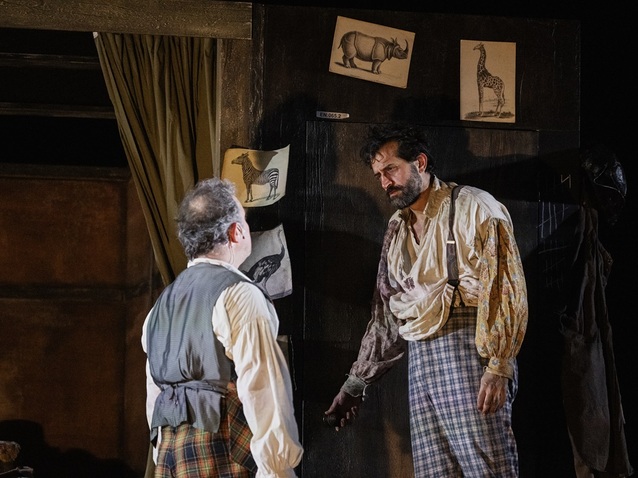 © Camilla Greenwell
© Camilla Greenwell
Giant, with music by Sarah Angliss and libretto by Ross Sutherland, was commissioned by Britten Pears Arts and first appeared at the Aldeburgh Festival in 2023. It explores the relationship between the eighteenth century British surgeon John Hunter and Charles Byrne who, measuring seven feet, seven inches (judged by his skeletal remains) was known as ‘The Irish Giant’. Following Byrne’s death in 1783, Hunter arranged for his body to be stolen while it was on its way to Margate in order to study it. This went against Byrne’s express wishes, who had specifically planned a burial at sea in order to thwart Hunter’s intentions. Today this episode is the one thing most readily associated with both men, leading the opera to highlight how their lives became intertwined. In fact, it makes the point that, because of what everyone remembers, the tendency has simply been for Byrne to be labelled as good and Hunter as evil. However, since both men are far more complex, the reality is that Byrne is a ‘false god’ and Hunter a ‘false Satan’.
The opera thus sets out to paint a more nuanced picture of both men by presenting a fictionalised account of their lives, from when Hunter first encountered Byrne entertaining people through to him reducing his corpse to a skeleton. Byrne is portrayed extremely sensitively by Karim Sulayman, whose light tenor gives him the requisite ethereal edge while still allowing him to come across as a three-dimensional human being. We first see him ‘entertaining’ audiences from a parlour made into a theatre by his manager Rooker (a splendid Galina Averina). Before he appears the atmosphere is akin to that of a stereotypical ‘freak show’, but the audience is moved on seeing and hearing him. They believe his height means he is closer to heaven than they are, but, while they show him a certain respect, it still feels as if they treat him like a novelty because they do not appreciate him as someone with his own needs. This is illustrated by the fact that the stage on which he appears is his bedroom, revealing how people are invading his most private space.

Jonathan Gunthorpe (John Hunter), Steven Beard (Howison), Giant © ROH 2024. Photo by Camilla Greenwell
One advantage that new operas have is that the composer and librettist can work with the production team to fulfil a joint vision, and in Sarah Fahie’s staging it certainly feels as if everything has been planned together. Hyemi Shin’s set sees Hunter’s laboratory stand next to Rooker’s parlour, with the latter, despite doubling as a theatre, looking no more glitzy or glamorous than the former. The set design thus supports the notion that Hunter and Byrne equally serve performance or entertainment functions. This comes into focus in a scene in which Hunter leads a public lecture, with the lights on the real audience going up so they really are the people being addressed. Hunter’s lecture raises the question of whether the audience is being exposed to higher truths or merely cheap entertainment, just as Byrne’s appearances do.
Jonathan Gunthorpe with this persuasive baritone succeeds in making Hunter a suitably ambiguous figure. In his lecture he readily proclaims that everything he says may one day be proved to be wrong, which may reveal astute awareness of the nature of scientific enquiry, or merely be his own excuse for presenting ideas he knows to be questionable. In other ways, his scientific endeavours seem so serious that they overrule all else. When he first meets Byrne his gesture of a handshake puts his hand directly in the position to take Byrne’s pulse. As Byrne describes his pain, Hunter sets about measuring him and, behind a curtain, carries out all sorts of poking and prodding as he analyses Byrne’s body. The fact that we only see this episode in silhouette makes it more horrifying because it leaves what Hunter is actually doing to the imagination.

Jonathan Gunthorpe (John Hunter), Karim Sulayman (Charles Byrne), Giant © ROH 2024. Photo by Camilla Greenwell
If Hunter is completely ignoring Byrne’s feelings in pursuit of scientific truth that might be deemed tasteless enough, but if it is to bolster his own standing (and we never know if his assertion that this is not about ego can be trusted) that is something else entirely. Byrne says he fears for his soul, and Hunter replies that that is already saved so it does not matter what happens to his body. Again, the question is whether this is a genuinely held, or simply self serving, belief. Hunter’s assertions in later scenes might on the surface suggest the latter, but deeper consideration may not necessarily lead to that conclusion.
The opera is consequently clever for exploring matters from multiple perspectives, with both the story and the staging highlighting ambiguities until the end. For example, Hunter’s accomplice Howison (a convincing Steven Beard) describes how the treatment of Byrne’s dead body is ‘botched’, making its value for scientific study somewhat limited. This reveals Hunter’s zeal in not taking the time to do the job properly, but also adds insult to injury because it means Byrne’s wishes were expressly ignored in pursuit of achieving relatively little anyway. It is a nice touch, however, at the end to hear Hunter proclaim that all we are is a body only to hear Byrne’s ethereal voice from offstage, suggesting that this is not so.
The musical forces, conducted by Ben Smith, comprise some eighteenth century instruments, with a small group of strings occupying one side of the stage. At different points we hear recorders and brass bells, with their players positioned on the other side, while bespoke music machines and live electronics also feature. The latter sometimes feel complemented by the voices of two further performers, Anna Cavaliero and Melanie Pappenheim, and there is some dialogue that features no musical accompaniment at all. The best advice for anyone attending would be to read up on John Hunter and Charles Byrne before doing so, if only by consulting their Wikipedia entries. While the plot is fairly easy to follow, having just a little prior knowledge of these characters will help no end in really hooking into all that you see.
By Sam Smith
Giant | 8 - 15 March 2024 | Linbury Theatre, Royal Opera House, Covent Garden
the 10 of March, 2024 | Print
Comments